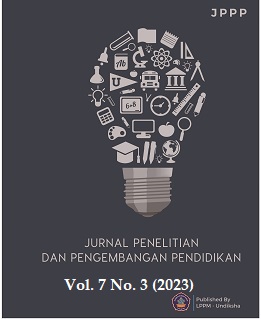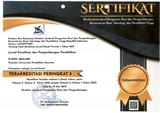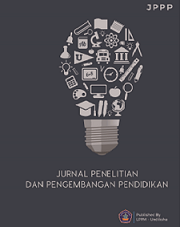Evaluation of the Implementation of the Independent Curriculum with a Technology-based Learning Model
DOI:
https://doi.org/10.23887/jppp.v7i3.66635Keywords:
Independent Curriculum, Learning Technology, Society Era 5.0Abstract
The implementation of the independent Curriculum in the field of education through the utilization of technology models oriented towards Society 5.0 era, such as Internet of Things (IoT) or Artificial Intelligence (AI), big data, and artificial robots that will fulfill human needs to address other requirements. This research analyze three perspectives: students, teachers, and institutions related to implementation of the independent Curriculum oriented towards Society 5.0 era. This study uses a mixed method research approach. The data collection technique in this study used random sampling techniques. Data analysis is inductive or qualitative, and the results of this study emphasize meaning rather than generalization. From the student's perspective, there is a significant difference indicating a significant difference between the previous curriculum-13 and the implementation of the Merdeka Curriculum in terms of students' development at school. From the teacher's perspective, indicates a significant difference, meaning that access to relevant educational resources and participation in professional activities are evident. From the institution's perspective, 97.9% of schools and teachers have accessed the digital platform of the independent Curriculum, with only 2.02% remaining to implement it. The implementation of the Merdeka Curriculum allows schools, teachers, and students the freedom to organize and develop their own curriculum while encouraging the use of technology in learning.
References
Agustini, K., Santyasa, I. W., & Ratminingsih, N. M. (2019). Analysis of competence on “TPACK”: 21st century teacher professional development. Journal of Physics: Conference Series, 1387(012035), 1–9. https://doi.org/10.1088/1742-6596/1387/1/012035. DOI: https://doi.org/10.1088/1742-6596/1387/1/012035
Ahyanuardi, A., Rahmadhani, S., Suryati, L., & Zuryana, Z. (2022). Realization of vocational high school curriculum based on work culture. Jurnal Pendidikan Vokasi, 12(1), 86–92. https://doi.org/10.21831/jpv.v12i1.44243. DOI: https://doi.org/10.21831/jpv.v12i1.44243
Alvendri, D., Giatman, M., & Ernawati, E. (2023). Transformasi Pendidikan Kejuruan: Mengintegrasikan Teknologi IoT ke dalam Kurikulum Masa Depan. Journal of Education Research, 4(2), 752–758. https://www.jer.or.id/index.php/jer/article/view/244.
Angga, A., Abidin, Y., & Iskandar, S. (2022). Penerapan Pendidikan Karakter dengan Model Pembelajaran Berbasis Keterampilan Abad 21. Jurnal Basicedu, 6(1), 1046–1054. https://doi.org/10.31004/basicedu.v6i1.2084. DOI: https://doi.org/10.31004/basicedu.v6i1.2084
Anggreini, D., & Priyojadmiko, E. (2022). Peran guru dalam menghadapi tantangan implementasi merdeka belajar untuk meningkatkan pembelajaran matematika pada era omicron dan era society 5.0. Prosiding Seminar Nasional PGSD UST, 1(1), 75–87. https://jurnal.ustjogja.ac.id/index.php/sn-pgsd/article/download/12380/5039.
Aulia, D., Murni, I., & Desyandri, D. (2023). Peningkatan Kompetensi Guru Sekolah Dasar melalui Platform Merdeka Mengajar (PMM. Jurnal Ilmiah Profesi Pendidikan, 8(1), 800–807. https://doi.org/10.29303/jipp.v8i1b.1310. DOI: https://doi.org/10.29303/jipp.v8i1b.1310
Daga, A. T. (2021). Makna Merdeka Belajar dan Penguatan Peran Guru di Sekolah Dasar. Jurnal Educatio FKIP UNMA, 7(3), 1075–1090. https://doi.org/10.31949/educatio.v7i3.1279. DOI: https://doi.org/10.31949/educatio.v7i3.1279
Darling-Hammond, L. (2006). Constructing 21st-century teacher education. Journal of Teacher Education, 57(3), 300–314. https://doi.org/10.1177/0022487105285962. DOI: https://doi.org/10.1177/0022487105285962
Dede, C. (2010). Comparing frameworks for 21st century skills. 21st Century Skills: Rethinking How Students Learn, 20(2010), 51–76. https://allchildrenlearning.org/wp-content/uploads/2019/12/Dede_2010_Comparing-Frameworks-for-21st-Century-Skills.pdf.
Desriandi, R., & Suhaili, N. (2021). Pengaruh Bakat Terhadap Motivasi Belajar Siswa Dalam Proses Belajar Dan Pembelajaran. Jurnal Edukasi, 1(2), 104–113. https://jurnaledukasi.stkipabdi.ac.id/index.php/JED/article/view/34.
Efgivia, M. G. (2020). Pemanfaatan Big Data dalam Penelitian Teknologi Pendidikan. Educate: Jurnal Teknologi Pendidikan, 5(2), 107–119. https://doi.org/10.32832/educate.v5i2.3381.
Elmahdi, I., Al-Hattami, A., & Fawzi, H. (2018). Using Technology for Formative Assessment to Improve Students’ Learning. Turkish Online Journal of Educational Technology-TOJET, 17(2), 182–188. https://eric.ed.gov/?id=EJ1176157.
Espino-Díaz, L., Fernandez-Caminero, G., Hernandez-Lloret, C. M., Gonzalez-Gonzalez, H., & Alvarez-Castillo, J. L. (2020). Analyzing the impact of COVID-19 on education professionals. Toward a paradigm shift: ICT and neuroeducation as a binomial of action. Sustainability (Switzerland), 12(14), 1–10. https://doi.org/10.3390/su12145646. DOI: https://doi.org/10.3390/su12145646
Hardiyana, A. (2016). Optimalisasi Pemanfaatan Teknologi Informasi dan Komunikasi dalam Pembelajaran PAUD. AWLADY: Jurnal Pendidikan Anak, 2(1), 1–12. https://doi.org/10.24235/awlady.v2i1.
Hart, C., Costa, C., D’Souza, D., Kimpton, A., & Ljbusic, J. (2021). Exploring higher education students’ critical thinking skills through content analysis. Thinking Skills and Creativity, 41(May), 100877. https://doi.org/10.1016/j.tsc.2021.100877. DOI: https://doi.org/10.1016/j.tsc.2021.100877
Huda, N. (2017). Manajemen Pengembangan Kurikulum. Al-Tanzim: Jurnal Manajemen Pendidikan Islam, 1(2), 52–75. https://doi.org/10.33650/al-tanzim.v1i2.113. DOI: https://doi.org/10.33650/al-tanzim.v1i2.113
Indarta, Y., Jalinus, N., Samala, A. D., Riyanda, A. R., & Adi, N. H. (2022). Relevansi Kurikulum Merdeka Belajar dengan Model Pembelajaran Abad 21 dalam Perkembangan Era Society 5 . 0. Edukatif : Jurnal Ilmu Pendidikan, 4(2), 3011–3024. https://doi.org/10.31004/edukatif.v4i2.2589. DOI: https://doi.org/10.31004/edukatif.v4i2.2589
Irawati, D., Najili, H., Supiana, S., & Zaqiah, Q. Y. (2022). Merdeka Belajar Curriculum Innovation and Its Application in Education Units. Edumaspul: Jurnal Pendidikan, 6(2), 2506–2514. https://doi.org/10.33487/edumaspul.v6i2.4603.
Izza, A. Z., Falah, M., & Susilawati, S. (2020). Studi literatur: Problematika evaluasi pembelajaran dalam mencapai tujuan pendidikan di era merdeka belajar. Prosiding Konferensi Ilmiah Pendidikan, 1, 10–15. https://proceeding.unikal.ac.id/index.php/kip/article/view/452.
Kalinowski, E., Egert, F., Gronostaj, A., & Vock, M. (2020). Professional development on fostering students’ academic language proficiency across the curriculum—A meta-analysis of its impact on teachers’ cognition and teaching practices. Teaching and Teacher Education, 88, 102971. https://doi.org/10.1016/j.tate.2019.102971. DOI: https://doi.org/10.1016/j.tate.2019.102971
Lase, D. (2019). Pendidikan di era revolusi industri 4.0. SUNDERMANN: Jurnal Ilmiah Teologi, Pendidikan, Sains. Humaniora Dan Kebudayaan, 12(2), 28–43. https://doi.org/10.36588/sundermann.v1i1.18. DOI: https://doi.org/10.36588/sundermann.v1i1.18
Lasmawan, I. W., & Suastra, I. W. (2023). Analisis Pemanfaatan Platform Merdeka Belajar (PMM) Oleh Guru Penggerak Di Kecamatan Rantau Selatan Kabupaten Labuhanbatu Dalam Implementasi Kurikulum Merdeka. Pendas: Jurnal Ilmiah Pendidikan Dasar, 8(1), 5776–5787. https://doi.org/10.23969/jp.v8i1.8818.
Liaw, S. S., & Huang, H. M. (2013). Perceived satisfaction, perceived usefulness and interactive learning environments as predictors to self-regulation in e-learning environments. Computers & Education, 60(1), 14–24. https://doi.org/10.1016/j.compedu.2012.07.015. DOI: https://doi.org/10.1016/j.compedu.2012.07.015
Muchlis, N. F. (2022). Pemanfaatan Platform Merdeka Mengajar dalam Meningkatkan Kualitas Pembelajaran dan Kompetensi Guru di Sulawesi Tenggara. Seminar Nasional Teknologi Pembelajaran, 2(1), 73–82. http://snastep.um.ac.id/pub/index.php/proceeding/article/view/29.
Muharnis, M., & Fadriati, F. (2023). Analisis Implementasi Kebijakan Kurikulum Pendidikan Nasional. Pendekar: Jurnal Pendidikan Berkarakter, 6(1), 49–59. https://doi.org/10.31764/pendekar.v6i1.12677. DOI: https://doi.org/10.31764/pendekar.v6i1.12677
Mustofa, M., & Mariati, P. (2023). Implementasi kurikulum merdeka belajar di sekolah dasar: dari teori ke praktis. Indonesia Berdaya, 4(1), 13–18. https://doi.org/10.47679/ib.2023371. DOI: https://doi.org/10.47679/ib.2023371
Putri Ningrat, S., Tegeh, I. M., & Sumantri, M. (2018). Kontribusi Gaya Belajar Dan Motivasi Belajar Terhadap Hasil Belajar Bahasa Indonesia. Jurnal Ilmiah Sekolah Dasar, 2(3), 257. https://doi.org/10.23887/jisd.v2i3.16140. DOI: https://doi.org/10.23887/jisd.v2i3.16140
Raharja, H. Y. (2019). Relevansi pancasila era industry 4.0 dan society 5.0 di pendidikan tinggi vokasi. Journal Of Digital Education, Communication, And Arts (Deca, 2(1), 11–20. https://doi.org/10.30871/deca.v2i1.1311. DOI: https://doi.org/10.30871/deca.v2i1.1311
Rakhmawati, D. (2017). Konselor Sekolah Abad 21: Tantangan Dan Peluang. Jurnal Konseling GUSJIGANG, 3(1), 58–63. https://doi.org/10.24176/jkg.v3i1.1067.
Rohmah, F. N., & Bukhori, I. (2020). Pengembangan Media Pembelajaran Interaktif Mata Pelajaran Korespondensi Berbasis Android Menggunakan Articulate Storyline 3. ECOEDUCATION (Economic & Education Journal), 2(2), 169–182. https://doi.org/10.33503/ecoducation.v2i2.892. DOI: https://doi.org/10.33503/ecoducation.v2i2.892
Sari, R. A., Musthafa, B., & Yusuf, F. N. (2021). Persepsi Guru terhadap Pembelajaran Berbasis Proyek di Sekolah Menengah Kejuruan. Jurnal Penelitian Pendidikan, 21(2), 1–11. https://doi.org/10.17509/jpp.v21i2.36972. DOI: https://doi.org/10.17509/jpp.v21i2.36972
Saryono. (2010). Metode Penelitian Kualitatif. Alfabeta.
Setiawan, R., Syahria, N., Andanty, F. D., & Nabhan, S. (2022). Pengembangan Modul Ajar Kurikulum Merdeka Mata Pelajaran Bahasa Inggris Smk Kota Surabaya. Jurnal Gramaswara, 2(2), 49–62. https://doi.org/10.21776/ub.gramaswara.2022.002.02.05. DOI: https://doi.org/10.21776/ub.gramaswara.2022.002.02.05
Setiyaningsih, S., & Wiryanto, W. (2022). Peran Guru Sebagai Aplikator Profil Pelajar Pancasila Dalam Kurikulum Merdeka Belajar. Jurnal Ilmiah Mandala Education, 8(4). https://doi.org/10.58258/jime.v8i4.4095. DOI: https://doi.org/10.58258/jime.v8i4.4095
Shaleh Assingkily, M. (2020). Upaya Mewujudkan Program Kampus Merdeka Pada Kurikulum PGMI STIT Al Ittihadiyah Labuhanbatu Utara. At-Thullab: Jurnal Pendidikan Guru Madrasah Ibtidaiyah, 4(2), 62–77. https://doi.org/10.30736/atl.v4i2.263. DOI: https://doi.org/10.30736/atl.v4i2.263
Sugiyono. (2011). Metode Penelitian Kuantitatif Kualitatif Dan R&D.
Sumarsih, I., Marliyani, T., Hadiyansah, Y., Hernawan, A. H., & Prihantini. (2022). Analisis Implementasi Kurikulum Merdeka di Sekolah Penggerak Sekolah Dasar. Jurnal Basicedu, 6(5), 8248–8258. https://doi.org/10.31004/basicedu.v6i5.3216. DOI: https://doi.org/10.31004/basicedu.v6i5.3216
Susilawati, N. (2021). Merdeka Belajar dan Kampus Merdeka Dalam Pandangan Filsafat Pendidikan Humanisme. Jurnal Sikola: Jurnal Kajian Pendidikan Dan Pembelajaran, 2(3), 203–219. https://doi.org/10.24036/sikola.v2i3.108. DOI: https://doi.org/10.24036/sikola.v2i3.108
Suzana, Y., Jayanto, I., & Farm, S. (2021). Teori belajar & pembelajaran. Literasi Nusantara.
Syaparuddin, S., Meldianus, M., & Elihami, E. (2022). Strategi pembelajaran aktif dalam meningkatkan motivasi belajar pkn peserta didik. Mahaguru: Jurnal Pendidikan Guru Sekolah Dasar, 1(1), 30–41. https://ummaspul.e-journal.id/MGR/article/download/326/154. DOI: https://doi.org/10.33487/mgr.v1i1.326
Usanto, U., Sucahyo, N., Warta, W., Khie, S., & Fitriyani, I. F. (2023). Transformasi Kepemimpinan Yang Bersifat Profetik Dan Pemberdayaan Masyarakat Di Era Society 5.0 Yang Berkelanjutan. Community Development Journal: Jurnal Pengabdian Masyarakat, 4(2), 5287–5301. https://doi.org/10.31004/cdj.v4i2.16607.
Voogt, J., & Roblin, N. P. (2012). A comparative analysis of international frameworks for 21st century competences: Implications for national curriculum policies. Journal of Curriculum Studies, 44(3), 299–321. https://doi.org/10.1080/00220272.2012.668938. DOI: https://doi.org/10.1080/00220272.2012.668938
Wahab, R. (2012). Reformulasi Inovasi Kurikulum: Kajian Life Skill Untuk Mengantarkan Peserta Didik Menjadi Warga Negara Yang Sukses. Ta’dib: Jurnal Pendidikan Islam, 17(02), 217–254. https://doi.org/10.19109/td.v17i02.33.
Wibowo, B. A. (2021). Kajian Kebijakan Kurikulum Indonesia 1947-2013. Journal on Education, 3(4), 420–432. https://doi.org/10.31004/joe.v3i4.2149.
Winarno, A., Fedin, M. Y. A., & Salleh, N. H. M. (2022). the Effect of Technological Literacy, Learning Facility, and Family Environment on Students’ Learning Motivation. Jurnal Pendidikan: Teori, Penelitian, Dan Pengembangan, 7(7), 246. https://doi.org/10.17977/jptpp.v7i7.15404. DOI: https://doi.org/10.17977/jptpp.v7i7.15404
Yulianti, M., Anggraini, D. L., Nurfaizah, S., & Pandiangan, A. P. B. (2022). Peran guru dalam mengembangan kurikulum merdeka. Jurnal Ilmu Pendidikan Dan Sosial, 1(3), 290–298. http://www.putrapublisher.org/ojs/index.php/jipsi/article/view/53. DOI: https://doi.org/10.58540/jipsi.v1i3.53
Zahwa, F. A., & Syafi’i, I. (2022). Pemilihan Pengembangan Media Pembelajaran Berbasis Teknologi Informasi. Equilibrium: Jurnal Penelitian Pendidikan Dan Ekonomi, 19(01), 61–78. https://doi.org/10.25134/equi.v19i01.3963. DOI: https://doi.org/10.25134/equi.v19i01.3963
Downloads
Published
How to Cite
Issue
Section
License
Copyright (c) 2023 Lili Suryati, Ambiyar Ambiyar, Nizwardi Jalinus

This work is licensed under a Creative Commons Attribution-ShareAlike 4.0 International License.
Authors who publish with the Jurnal Penelitian dan Pengembangan Pendidikan agree to the following terms:
- Authors retain copyright and grant the journal the right of first publication with the work simultaneously licensed under a Creative Commons Attribution License (CC BY-SA 4.0) that allows others to share the work with an acknowledgment of the work's authorship and initial publication in this journal.
- Authors are able to enter into separate, additional contractual arrangements for the non-exclusive distribution of the journal's published version of the work (e.g., post it to an institutional repository or publish it in a book), with an acknowledgment of its initial publication in this journal.
- Authors are permitted and encouraged to post their work online (e.g., in institutional repositories or on their website) prior to and during the submission process, as it can lead to productive exchanges, as well as earlier and greater citation of published work. (See The Effect of Open Access)








